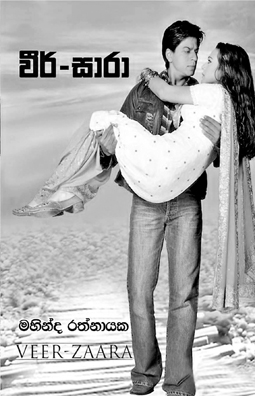Of love: and love that dare not speak it's name
Book: Veer Zaara
Author: Mahinda Rathnayake
Reviewed by: Daya Dissanayake
Mahinda Rathnayake displays his writing skills and imaginative powers
once again in his new collection of stories titled Veer Zaara. He has
called them short stories, probably because the stories are short.
The categorisation of creative writing into novels, short stories,
poetry or flash fiction only cramps the writer's style, and limits his
powers of expression. Rathnayake seems to have overcome such
restrictions, as he has always been moving from very lengthy stories,
identified as novels, to much shorter stories.
 It
needs special skills to relate a story with about 100,000 words or as
little as 5,000. Rathnayake has shown this skill when he wrote ‘Wala
Yatin Mihimandalata Ira Paya’ which won the Godage Award and should have
been short listed for the Swarna Pusthaka. It
needs special skills to relate a story with about 100,000 words or as
little as 5,000. Rathnayake has shown this skill when he wrote ‘Wala
Yatin Mihimandalata Ira Paya’ which won the Godage Award and should have
been short listed for the Swarna Pusthaka.
In the introduction, Rathnayake says that unlike a novel which
remains with us for a long time, a short story leaves us in an hour or
two, and thus a short story writer needs to take greater efforts to
retain the story in the mind of the reader, and to make a lasting
impression. A good short story does that, more often than a novel.
We remember some short stories we read decades ago, while we cannot
remember anything, or only a few incidents, from some of the great
novels we have read. Rathnayake is trying to give us such short stories
to keep us for a lifetime, and it is up to the reader to find out by
reading Veer Zaara.The author believes that the true artist should be
honest with himself. He also believes that literature could bring
humaneness back to humanity, and bring back empathy into a society where
people have moved away through false sympathy, apathy and into
antipathy. He is attempting to bring some happiness to the oppressed and
suppressed people in our society.
We need to make our contribution as writers, however small it may be,
to write for happiness, in order people could read for happiness, to
reduce the inequality in our society, to bring justice and for freedom
for all. Most important comment I found in his acknowledgements was to
the experience he gained from man, from animals, plants, rivers and
streams. A person who could learn from nature, who could empathize with
nature is a true artist and creations by such an artist is what we need
today.
This empathy we find in his differently abled (both mentally and
physically) children and how the inhuman society exploits them, in the
first story titled ‘The Prey'. Then we are all reminded how powerful a
mother's love is. From the mother's move we move to a love triangle,
from a new angle, making us to pause for a moment to think of what love
is. Rathnayake has been able to bring to us the plight of the women and
mothers not only in our country, but all over the world.
The author hints, under the title, “I would like to be Veer.......Zaara...but.....”,
that many young people dream of being like the heroes and heroines in
the popular films of today. They are productions by dream merchants who
want only to earn quick and high profits by selling these dreams.
Rathnayake, however uses this to tell us a story, about a person for who
may never be a Veer or a Zaara.
Love is the theme of this story, “the love that dare not speak it's
name” (Alfred Douglas 1894). Not only in 19th century England, but even
in 21st century Sri Lanka, so much so that we do not have a colloquial
Sinhala term for a gay female. Rathnayake also talks of another love, a
theme which is really taboo in most societies, a love that are skeletons
in the cupboards of many religious organisations, but which has existed
for millennia, and which exists even now.
Rathnayake has the courage to write about them. It would have been a
good story if it had been limited to the sexual exploits, without
linking it to an incident reported from a sacred institute in Sri Lanka,
or if it had been written without identifying a time and place, because
such incidents had happened, and will happen all over the world.
They are all stories worth reading, and some of them worth more than
one reading. We could look forward to reading more of Mahinda Rathnayake,
both in the long and short forms of creative writing. |

